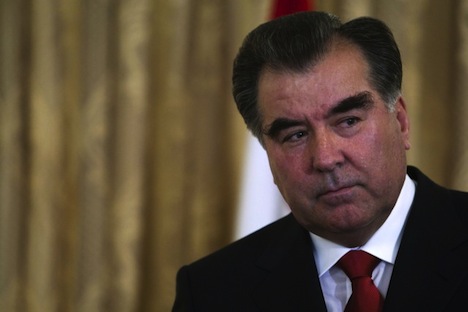Within Russia and the 14 other former Soviet republics, there are two flavors of politics.![]()
In one set of former Soviet countries, there’s the unmistakable emergence of strengthening, if imperfect and fragile, democratic institutions. That’s true for the three European Union states (Latvia, Lithuania and Estonia), as well as Moldova, Ukraine and Georgia, in fits and starts.
But in the other set, it’s as if the Soviet Union never crumbled, and the authoritarian model of Soviet government remains as strong as ever — in the case of Azerbaijan, which held its presidential election last month, Ilham Aliyev was overwhelmingly reelected, renewing the Aliyev family’s hold on Azerbajian since the 1970s.
So it was in Tajikistan, where Imomali Rakhmon was reelected president with nearly 87% of the vote on November 6 — Rakhmon first came to power in 1992 after the fall of the Soviet Union, and he managed to hold onto power through a brutal five-year civil war that took on elements of a proxy war between Russia and Iran, which ended only in 1997. In recent years, Rakhmon has presided over an essentially authoritarian state.
Human rights activist Oynihol Bobonazarova was prohibited from running against Rakhmon in the recent election, clearing the way for Rakhmon’s rubber-stamp reelection.
International observers roundly criticized the vote:
Andreas Baker, presidential adviser to the OSCE’s Parliamentary Assembly and an OSCE election observer in Dushanbe, said that “while quiet and peaceful, this was an election without a real choice.” In an interview with RFE/RL’s Tajik Service, Baker criticized Rakhmon for taking advantage of his incumbency. “While there was extensive state media coverage of the official activities of the incumbent president, that meant that he had a significant advantage throughout the campaign,” Baker said.
Baker also mentioned irregularities in the election. “The observation mission took note of widespread proxy voting, family voting, and group voting, as well as indications of ballot-box stuffing on election day,” he said.
Tajikistan is one of the five central Asian republics that, taken together among the former Soviet republics, have proven most impervious to democracy. ‘Great Game’ analogies aside, it’s a region that’s attracting greater attention from the United States, China and even India — not to mention Russia’s long-standing influence.
Tajikistan has more distance from Moscow than any of the other four Central Asian nations — it doesn’t even border Kazakhstan, let alone Russia. It shares a long border with Afghanistan to the south, which makes it a country of some significance to the United States, especially as US military involvement in Afghanistan winds down in 2014. It also shares a border with China’s Xinjiang province to the east. Beijing is equally interested in Tajikistan’s stability, lest it disrupt a population of ethnic Uyghurs in Xinjiang who practice Muslim and are much closer culturally to Central Asia than to the Han Chinese culture that dominates the People’s Republic of China.
Ethnic Tajiks comprise the vast majority of the country’s population (around eight million) — they speak Tajik, a variant of the Persian language, and they largely practice Sunni Islam. A once sizable Russian minority shriveled to less than 1% of the population during the civil war, and Russian ceased to have any official role in Tajikistan four years ago.
Following the civil war, Tajikistan’s economy grew rapidly, and it continues to mark relatively high GDP growth — around 8% in 2012. But don’t let that fool you — the high-growth is in part due to such an unimpressive starting point, and Tajikistan remains the poorest of the Central Asian republics. Its economy is based chiefly on aluminum mining, cotton cultivation and little else — and certainly not the kind of vast oil and natural gas wealth that’s boosted Kazakhstan, Azerbaijan and Turkmenistan. Remittances from abroad (mostly Russia) amount to up to between one-third and one-half of the country’s GDP. Rakhmon’s regime is riddled with corruption and it hasn’t been incredibly keen on economic reforms, either, and Tajikistan is a major transit point for heroin and other opiates between Afghanistan and Russia/Europe.
Continue reading Imomali Rakhmon extends two-decade rule after winning sham election in Tajikistan


